[This is Part One of a three-part series on the (i) parallel political tracks of Walter Mondale and Tom Eagleton, and (ii) my good fortune to work on their campaigns.]
In the fall of 1960, I was in my sophomore year at the Missouri School of Mines and Metallurgy in Rolla. That November, Tom Eagleton and Walter Mondale each won his first statewide election. At the time, I doubt I noticed their victories. But I would come to appreciate these two fine public servants and have the honor of working with both of them. Here’s the story.
1960 Attorneys General: In 1960, Tom Eagleton (Missouri) and Walter “Fritz” Mondale (Minnesota) each won his first statewide race – Attorney General. Mondale had been appointed to the position the previous May, filling a vacancy and becoming the youngest AG in the nation at 32. He then retained the position in the November election, but he was no longer the youngest. Tom Eagleton was 31. Mondale quipped that he was going to have to reprint all his bios that said he was the youngest. Within 16 years, each would be the Democratic nominee for Vice President.
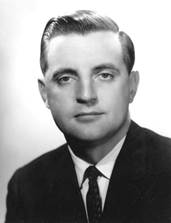
Eagleton was the first Roman Catholic to be elected to statewide office in Missouri. John F. Kennedy, the first Catholic to be elected President, also won Missouri in 1960. I was busy with college at the time and did not even have the right to vote. I was 19, but the reduction in voting age to 18 did not occur until 1971.
I have little personal memory of Eagleton as Attorney General, but if my parents were a typical example, his name became a household word in Missouri for one thing: the Blue Laws. For some 137 years, only items of “immediate necessity” could be sold on Sunday in Missouri. The law was openly flouted by discount stores, car dealers and others. Those abiding by the law complained to Eagleton. His path to ending the antiquated Blue Laws was to enforce them, closing down businesses that operated on Sunday. This had his intended result. A test court case found that the law was vague, and the legislature took action to pass less restrictive Sunday closing laws.
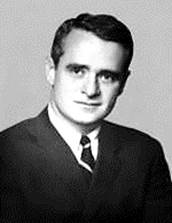
Mondale and Eagleton became fast friends as they worked on projects together. One of the most important was filing a joint amicus brief with other attorneys general in support of requiring states to provide counsel for indigent defendants – their position prevailed in the landmark case of Gideon v. Wainwright. On the first page of Mondale’s autobiography, he references working with Eagleton on the case: “At that time I was in touch with several of my counterparts around the country, people such as Tom Eagleton in Missouri, a great friend who later became a wonderful senator…”
1964 Elections: Mondale and several attorneys general met with President Kennedy in the White House on October 8, 1963. The next month, President Kennedy was assassinated. Lyndon Johnson became the new President, and this would soon have a major impact on Mondale’s political future.
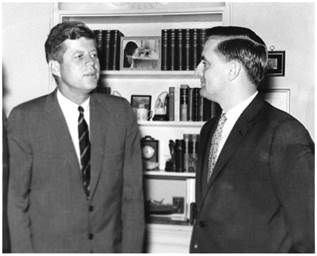
President Kennedy and AG Mondale
President Johnson chose Senator Hubert Humphrey to be his running mate in the 1964 election. After Humphrey won and vacated his Senate seat, Mondale was appointed to succeed him in the U.S. Senate.
In Missouri, Tom Eagleton was elected Lt. Governor. He knew the office was less important than Attorney General, but it did not require that he live in Jefferson City. He considered this to be his “Get Out of Jail Free” card while he waited to run for what he really wanted, a seat in the United States Senate.
1968 Elections: I first became active in politics in 1968, a year after I graduated from law school. I was recruited by my high school buddies Bill Lochman and Jim Graham to join the Young Democrats. It was as much social as it was political. We mostly worked on local Jackson County races and were closely tied to the Committee for County Progress (CCP). But there was a statewide race that had us all excited: Tom Eagleton was challenging Senator Ed Long in the U. S. Senate race. Long had the power of incumbency, but was dogged by a Life Magazine article exposing his splitting of legal fees with Morris Shenker, a St. Louis attorney who represented the jailed Jimmy Hoffa of the Teamsters.
Also in the Democratic primary was wealthy businessman True Davis who had been Ambassador to Switzerland in the Kennedy administration. When Davis spoke to our Young Democrats club, I remember that he smoked True cigarettes to match up with his first name. He also borrowed a campaign slogan from their ads (substituting “man” for “brand”): “Shouldn’t your man be True?”. Obviously those were very different times. Eagleton did not borrow from any cigarette ads, but was well known for his two to three packs a day of Pall Malls.
Two of Eagleton’s key endorsements came from Jackson County: the reform CCP and the influential black political club, Freedom, Inc. With Long and Davis splitting the Vietnam “hawk” vote, the “dove” Eagleton won the primary with 36.65% of the statewide vote (Long – 32.51% and Davis – 29.28%). Eagleton then beat Republican Congressman Tom Curtis in a close race in the general election (51/49). There was a downside in heading to Washington: Nixon beat Humphrey in the presidential race.
Super Bowl and the Senate: On January 11, 1970, I watched Super Bowl IV with Young Democrat friends Ray and Rosalind Webb and Pat Hininger. We of course liked the result: the KC Chiefs over the Minnesota Vikings 23 – 7. Tom Eagleton also enjoyed the victory as he won his bet with Walter Mondale for a dinner:
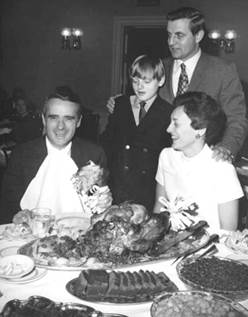
Here they are in a committee hearing on March 16, 1971 (with Rep. Charles Vanik of Ohio):
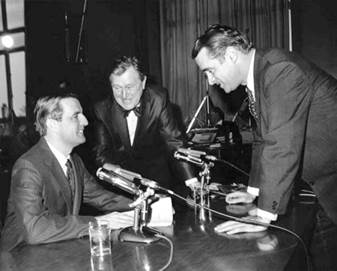
1972 Elections: Eagleton and Mondale again shared history, this time after George McGovern won the Democratic nomination for President. After Ted Kennedy turned down the VP slot, McGovern offered it to his friend Walter Mondale. Mondale declined. Next on the list was Tom Eagleton. He did not decline. Those of us from Missouri were ecstatic, and I was in the large welcoming crowd at the old Municipal Airport when he came in to campaign.
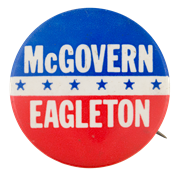
Eagleton was dropped from the ticket on August 1, just 18 days after his nomination. But his popularity soared in Missouri. On August 12, I was at Arrowhead for the inaugural game at the new stadium. It was an exhibition game between the two Missouri NFL teams, the Kansas City Chiefs and the St. Louis Cardinals. In the pregame festivities, Eagleton came on the field and received a thunderous ovation.
[Although Eagleton was later reelected twice and served 18 years with distinction in the Senate, he predicted that the first paragraph of his obituaries would be the fallout from taking that McGovern offer. He was right. The NYT headline in 2007 was typical: Thomas F. Eagleton, 77, a Running Mate for 18 days, Dies.]
1974 Elections: Mike White won the Democratic primary in the race to succeed George Lehr as Jackson County Executive. Tom Eagleton was running for a second term and leveraged his popularity to help the only other statewide candidate, George Lehr for State Auditor. I moved from being Mike’s campaign manager to Chairman of the Democratic County Committee. Mike and I worked closely with Eagleton staffers and found out first hand why they had a reputation as some of the best (and nicest) operatives in Missouri and DC. Tom Eagleton attracted good people.
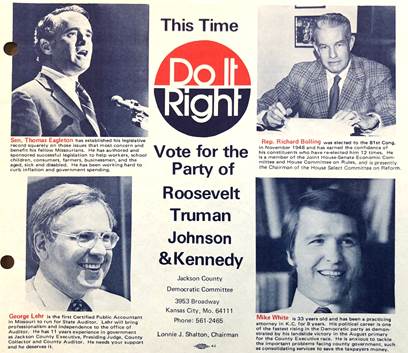
In October, the County Committee (with an assist from Eagleton) brought in Walter Mondale to speak at a general election rally. At this stage, Mondale was in the midst of a test run for the presidency. After Mondale finished his speech, I remember thanking him on stage and, in the high of the moment, telling the crowd that we just heard from the next President of the United States. Sounded good, and he had said he was 99% sure he would be running in 1976. Below, Rita and I with Mondale.
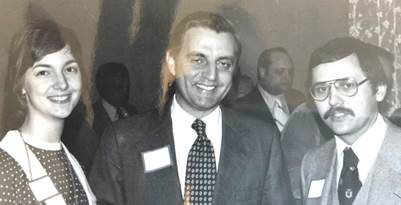
The next day, there was a breakfast for Mondale to meet local Democratic politicos (photos and captions courtesy of Jan Hodgson and Kay Wallick):
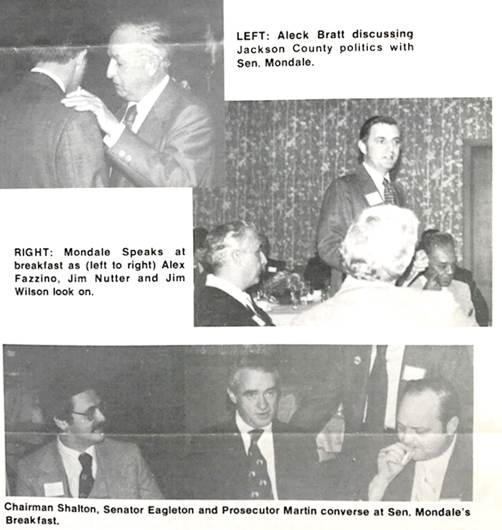
After the breakfast, we went to the airport in Mike White’s car. Mondale was squeezed (not happily) in front with Mike and me, and Mondale’s three staffers sat in the back. This was quite a contrast to the secret service limos and motorcades that would become his normal transportation just two years later.
In November, Mike White, George Lehr and Tom Eagleton won their general election races. Eagleton ran against the same opponent, Tom Curtis, and won 60/40 with his McGovern bump. That same month, Mondale ended his presidential run, saying “After more than a year of constant travel, constant fund-raising, and constant speeches, I had pulled about even with ‘None of the Above’ in national opinion surveys, and I dropped that bid – to widespread applause.” Cramped car rides with political groupies had probably not helped.
1975 – Washington D.C.: A perk as County Chairman was a lunch with Tom Eagleton in the Senate dining room.
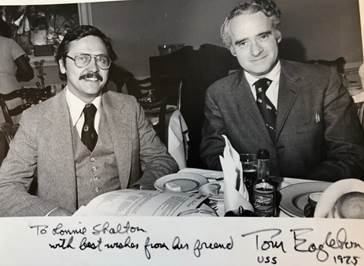
1976 – U.S. Supreme Court: A nice thing to hang on the wall at a law office is a certificate showing admission to the United States Supreme Court. This would be mostly honorific in my case as I certainly had no cases headed to the Supreme Court. As an applicant, I needed to get signatures from three members of the Supreme Court bar: two “sponsors” and one to “move” the admission. I thought it would be cool if former Attorneys General Eagleton and Mondale were on my application. The third recruit was Congressman Jim Symington who I had met and was running to succeed his father who was retiring from the Senate.
My friend Paul Donnelly was in Senator Stuart Symington’s DC office, and he volunteered to round up the signatures. I had worked with Paul in 1972 when he came home to KC for the summer to work on the CCP campaign. Paul quickly got the two sponsors – Tom Eagleton and Jim Symington. That left Mondale to “move the admission.” Alas, when Paul contacted Mondale’s office, he was advised that the former Attorney General of Minnesota had never become a member of the Supreme Court bar. So Paul had to find someone else. He did good.

Eagleton and Baseball: Soon after I met Tom Eagleton, I found that we shared a passion outside of politics – baseball. He was a loyal Cardinals fan, but he was also happy to say nice things about the Royals. As a wise politico, it was probably not lost on him that Royals fans also vote. In 1976, he got an opening to act on this.
The Royals played the Yankees in the ALCS. Howard Cosell was on the ABC broadcasting team, and his pro-Yankee coverage grated on those rooting for the Royals. So after the Yankees had won the series, Eagleton fired off a letter on Senate stationery to Roone Arledge, the head of ABC Sports. Eagleton included me in his list of three to receive blind carbon copies. And the letter was released to the press. Here is what he said:
“I wish to add my name to the list of thousands in opposition to Howard Cosell’s broadcasting of the playoffs between the Kansas City Royals and the New York Yankees. I realize that Cosell’s obnoxiousness is the reason that ABC finds him so marketable. As a loyal, devoted baseball fan, I always have derived great comfort from the fact that our ‘nation’s pastime’ was free of Cosell. Hopefully, after the World Series that will be the case once again.
Reggie Jackson’s endless commentaries, although not as offensive as Cosell’s, were inane in their own right. He talks and talks saying next to nothing. Perhaps this was his way of keeping Cosell off the air.”
Yours very truly, Thomas F. Eagleton, Devoted Baseball Fan
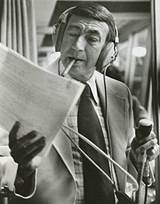
Cosell’s response was printed on October 22 in the Kansas City Times. Cosell expressed disdain for Eagleton’s criticism, calling Tom a Johnny-come-lately to the ranks of Cosell critics. Cosell quoted Abraham Lincoln, “If I would read, much less answer, all the attacks on me, my shop would be closed to any business.” Cosell said he was flattered because Eagleton “is a member of the greatest legislative body in the world. However, he comes but lately to the arena.”
As you might guess, the scuffle with Cosell boosted Tom’s popularity in Kansas City.
Hubert Humphrey: The story of Walter Mondale cannot be told without Hubert Humphrey. In 1947, 19-year-old Mondale worked on Humphrey’s re-election campaign for Mayor of Minneapolis. In 1948, Mayor Humphrey electrified the Democratic National Convention with his emotional call for civil rights (“…get out of the shadow of states’ rights and walk forthrightly into the bright sunshine of human rights.”). He then went home to finish his successful race for the U.S. Senate, a campaign in which Walter Mondale played a major role. In 1964, Mondale was appointed to this very seat when Humphrey was elected Vice President.
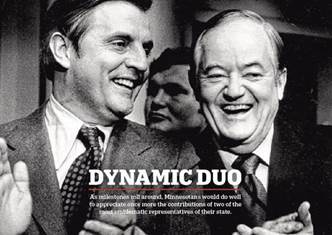
Although Humphrey lost to Nixon in 1968, he stayed in the game and returned to the Senate in 1970, becoming Minnesota’s “junior” senator (to Mondale). In May of 1976, Mondale’s name was being floated as a running mate for Jimmy Carter. Humphrey met with Mondale to urge him to go for it, “Fritz, you must do this. You’ll get more done down there in two days than you will up here in two years.” Mondale teased Humphrey for trying to get rid of him so Humphrey could again be the “senior” senator. Mondale went for it, and “Grits and Fritz” teamed up for the 1976 national race.
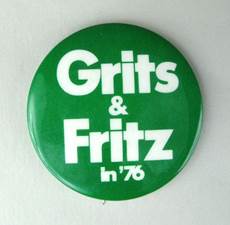
1976 Elections: My main effort in the 1976 primaries was for Jim Symington who lost his bid for the Senate to Congressman Jerry Litton who tragically died in a plane crash on election night. Soon after that, I was at a political event that Senator Eagleton was attending. I struck up a conversation with Eagleton staffer Gene Godley who was transitioning to the Mondale campaign. I was wondering “what will I do now,” and Gene said he would put in word with the Mondale campaign staff. And that’s how an Eagleton connection landed me a position as a part-time Mondale advance man.
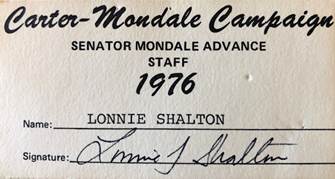
This was the start of a very unexpected new chapter in my life. For the next two plus months I was on the road in the middle of a national campaign. I still had my day job at the Popham firm, so I would go out for a campaign stop and then return for a few days to catch up with my practice. Then back on the road. It was a blast. When the election was over, the part-time work continued for Mondale as Vice President, including official trips to three continents. I’ll tell some of those stories in Parts Two and Three. Please keep an eye on your inbox.